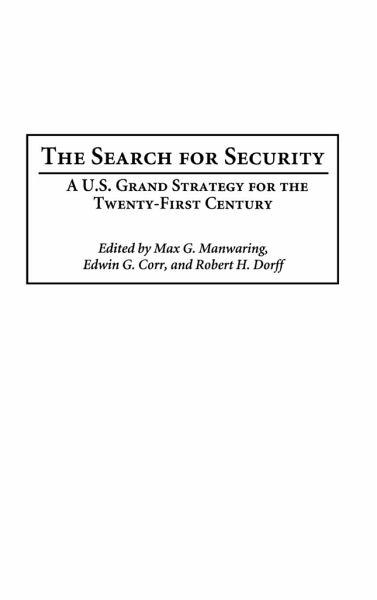
The Search for Security
A U.S. Grand Strategy for the Twenty-First Century
Herausgeber: Manwaring, Max; Dorff, Robert; Corr, Edwin
Versandkostenfrei!
Versandfertig in 1-2 Wochen
52,99 €
inkl. MwSt.

PAYBACK Punkte
26 °P sammeln!
One of the most common criticisms of current U.S. security policy is that it lacks an overarching strategy, leading to a tendency to address problems and crises individually and in isolation as they arise. This study provides a broad description of the contemporary global security environment and an examination of U.S. security policy since the end of the Cold War. Traditional threats, such as those associated with major theater war, now coexist with newer nontraditional threats. The authors maintain that a sound strategy must support the ability of a country to hedge and adapt to a highly vol...
One of the most common criticisms of current U.S. security policy is that it lacks an overarching strategy, leading to a tendency to address problems and crises individually and in isolation as they arise. This study provides a broad description of the contemporary global security environment and an examination of U.S. security policy since the end of the Cold War. Traditional threats, such as those associated with major theater war, now coexist with newer nontraditional threats. The authors maintain that a sound strategy must support the ability of a country to hedge and adapt to a highly volatile security landscape. That, in turn, is accomplished through an executive level organizational mechanism to authoritatively integrate and execute a cogent national policy. Understanding the key concepts of strategy and strategy formation is essential in order to place specific challenges-such as global instability and state failure-in an appropriate strategic context. The contributors outline the conceptual guidance for a relevant strategy to deal with the myriad political, economic, informational, and deterrence threats and challenges generated in today's unstable, chaotic, violent, and ambiguous global security environment. Their conclusions are unequivocal. The United States must come to grips with the fundamentally transformed nature of security challenges and opportunities of the 21st century. To do so requires a significant change in how the country develops its security strategy and how the country is organized to plan and implement that strategy.














